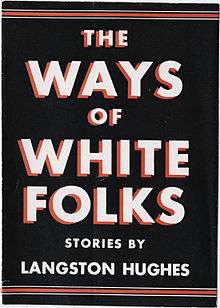The Ways of White Folks
 | |
| Author | Langston Hughes |
|---|---|
| Country | United States |
| Language | English |
| Genre | Short story collection |
| Publisher |
Knopf (first edition) Vintage (1990) |
Publication date | 1934 |
| Pages | 248 (first edition) / 272 (1990 paperback) |
| ISBN | 0-679-72817-1 (1990 paperback) |
| LC Class | PZ3.H87313 Way PS3515.U274 |
| Preceded by | Scottsboro Limited (1932) |
The Ways of White Folks is a collection of short stories by Langston Hughes, published in 1934.[1] Hughes wrote the book during a year he spent living in Carmel, California.[2] The collection, "marked by pessimism about race relations, as well as a sardonic realism or, contextually: humorous racism,"[2] is among his best known works.[3] Like Chesnutt's The Conjure Woman (1899) and Wright's Uncle Tom's Children (1938), it is an example of a short story cycle.[4]
The collection consists of 14 short stories:[5]
- "Cora Unashamed"
- "Slave on the Block"
- "Home"
- "Passing"
- "A Good Job Gone"
- "Rejuvenation Through Joy"
- "The Blues I'm Playing"
- "Red-Headed Baby"
- "Poor Little Black Fellow"
- "Little Dog"
- "Berry"
- "Mother and Child"
- "One Christmas Eve"
- "Father and Son"
In September 1996, upon the publication of a comprehensive edition of Hughes's short stories entitled The Short Stories of Langston Hughes (ISBN 0-8090-1603-6), David Herbert Donald, in a review published by The New York Times, wrote:[6]
Hughes's short stories might occupy a larger place in American literature had they all lived up to the standard he set in The Ways of White Folks, written when he was under the immediate influence of D. H. Lawrence and when he was still a passionate socialist. He could not sustain the tone of those powerful, polemical pieces. Temperamentally averse to confrontation, in subsequent years he allowed his tone to slip from irony to sarcasm, and his later short stories — some of which ran to only two or three pages — were often scenes or vignettes, without much room for characterization or development.
"Cora Unashamed"
David Herbert Donald called "Cora Unashamed" — one of the stories in The Ways of White Folks — "a brilliantly realized portrait of an isolated black woman in a small Middle Western town, who stoically survives her own sorrows but in the end lashes out against the hypocrisy of the whites who employ her."[6] That story was adapted into a film of the same name from The American Collection directed by Deborah M. Pratt, starring Regina Taylor and Cherry Jones, and released in 2000.[7] Cinematographer Ernest Holzman won an American Society of Cinematographers (ASC) Award, for Outstanding Achievement in Cinematography in Movies of the Week/Mini-Series'/Pilot for Network or Basic Broadcast TV, for his work on this film.[8]
Additional Resources
- Hans Ostrom. "Langston Hughes’s ‘The Blues I’m Playing,’" in a Reference Guide to Short Fiction, ed. Thomas Riggs. Detroit: St. James Press, 1999, 770-771.
- Hans Ostrom. “Teaching The Ways of White Folks,” in Teaching the Harlem Renaissance, ed. Michael Soto. New York: Peter Lang, 2008, Part II, Chapter 13, 137-144.
- Hans Ostrom. Langston Hughes: A Study of the Short Fiction. New York: Twayne, 1993.
References
- ↑ "Hughes, (James) Langston". The Encyclopedia of Cleveland History. Case Western Reserve University. Retrieved 2010-07-15.
- 1 2 Rampersad, Arnold. "Arnold Rampersad on Langston Hughes" in "A Centennial Tribute to Langston Hughes". Howard University. Retrieved 2010-07-15.
- ↑ "Today in History: February 1". American Memory. Library of Congress. Retrieved 2010-07-15.
- ↑ "Black Literature". Encyclopedia of Southern Culture. University of North Carolina at Chapel Hill. Retrieved 2010-07-15.
- ↑ Boos, Florence S. (September 3, 2010). "Works by Langston Hughes". Study Questions. University of Iowa. Retrieved 2011-06-27.
- 1 2 Donald, David Herbert (September 1, 1996). "Good Race Men". The New York Times. Retrieved 2010-07-15.
- ↑ "Cora Unashamed Cast and Credits". The American Collection. PBS. Retrieved 2010-07-15.
- ↑ "Cora Unashamed (2000) (TV) - Awards". Internet Movie Database. Retrieved 2010-07-15.
External links
- "Works by Langston Hughes". The American Collection. PBS., featuring three of the short stories from The Ways of White Folks